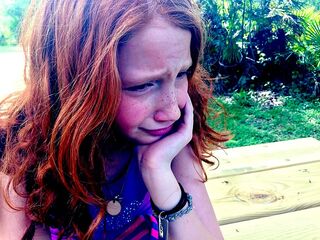Suicide
No Child Should Think About Suicide
A Personal Perspective: Expectations are triggering suicidal ideation in kids.
Posted August 12, 2021 Reviewed by Lybi Ma
Key points
- Nobody, at any age should contemplate suicide.
- Children and old people contemplate suicide because they think they are in our way.
- A state of emergency has been declared in Colorado due to a dramatic increase in child suicides.
Ideation in Old Age
When we grow old, we sometimes start to wonder if life is still worth living. We should never do that, but people often do. If you're old like me, you may feel like you haven’t done anything worthwhile during your lifetime. No one wants to hire us anymore. We seem to be in everyone’s way. Our friends are dying all around us. Our kids make us feel like we are bothering them when we call. Every cell in our body hurts, but nobody seems to care. Sometimes, in the dark and lonely watches of the night, unwanted thoughts creep in—tempting us to imagine how much better off the world would be without old worthless people like us.
Ideation in Youth
When we are young though—when we're still children—we should never ever have unwanted thoughts like that. Why not? Well, for one thing, our body doesn’t ache all the time. Our friends and family are in no danger of dying before we do. We have all of life ahead of us and such unwanted thoughts should never ever creep in. We're not in anybody’s way—because we're at that age when all things are still possible.
Recently, however, young people do have such thoughts. They feel like they're in our way. Why? It’s because our expectations for them are way out of their reach. Add to that the uncertainty and isolation of this pandemic—it's the last straw. More children than ever before are taking their lives. A state of emergency has been declared in Colorado; the number of children attempting suicide there has gone up by 72 percent since 2019 (Hausmann, 2021).
The Fear of Not Growing Up
Why would a child become so depressed? Maybe Erik Erikson had an answer for that. He noticed that most children will have to overcome a crisis in adolescence—the fear of never growing up (James & Zarrett, 2006). Many children will be overwhelmed by the fear of personal failure. And so, sometimes, in the dark and lonely watches of the night, unwanted thoughts creep in—tempting our children to imagine how much better off the world would be without them. I have spoken to young people who have had such thoughts. It broke my heart to hear their despair. Like the fear of lifelong failure in old age, young people at the dawn of life believe they have already failed.
Their Mistrust Arises from Our Conditional Regard
We expect too much of them. Nobody, at any age, should feel like he or she is in the way. No one should wonder if the world might be better off without them. But old people do. Even young people do. Yes, we have services in place to address their despair. But their despair is not going away. I asked them, and the problem is mistrust. And yes, Erikson nailed that one too—it’s not just the first stage, but a lifelong stage when a developing person wonders whether anybody really cares. These troubled youth question whether such services are meant to help them or ignore them. They consider these hotlines to be placebos at best. They don’t trust the very people and services that might help them. They ought to, of course. But if they think such thoughts, they won’t call and get help (no matter how accessible our mental health services are). Doing more of what we are already fervently doing probably isn’t going to create the breakthrough we are all hoping for.
Can anything be done then? Some of us believe there is something we can do. Dr. Mary Ann Markey and I discussed this problem, how hopelessness is infecting childhood, in Examining Biophilia and Societal Indifference to Environmental Protection (Markey & Meinecke, 2020). These children feel desperate because society looks at their childhood as a temporary stage of the lifespan—instead of a reason for being alive all by itself. They are ashamed of being children. They are afraid they will take “too long” to grow up. They are terrified of never becoming a person, of never finding our unconditional positive regard (Rogers, 1961).

Honor Childhood
The solution, then, is to do something new. The solution is to grant them today what they are afraid we will never give them. That way, no matter how long it takes for this pandemic to go away, no child will have to wait very long for his or her share of our regard. You see, if we revere childhood itself, no child will be exposed to the fear of not growing up. Nothing is more terrifying than being constantly reminded you will never have any value unless you accomplish something you can’t accomplish. Doesn’t this make sense? If every stage of the lifespan is precious, not just the “productive years,” no child will have to wait very long for our regard.
Honor Women and Children
Do you remember how women used to be treated this way? We looked at womanhood as an inferior human condition, here only to spawn and comfort hard-working men. A few brave men spoke out and defended the worth of womanhood in its own right. They told them to say out loud, “My life was not in vain” (Frankl, 1990).
Why don’t we do the same for our children? Let’s tell our children to say out loud, “My life is not in vain!” Whether a person grows up or not should not change our regard for a human being. No one, old or young, male or female, should think about taking their life because "able" people don’t think they matter. If we just remind our children every day how glad we are they exist, we can be their loudest ally against those secret thoughts of theirs—those voices that whisper to get out of our way.
References
Frankl, V. (1990). Facing the transitoriness of human existence. Generations, 14(4), 7. Retrieved from http://www.asaging.org/generations-journal-american-society-aging
Hausmann, J. (2021, June 15). Why we’ve declared a state of emergency for children’s mental health. US News. Retrieved from https://www.usnews.com/news/health-news/articles/2021-06-15/why-weve-de…
James, J. B., & Zarrett, N. (2006). Ego integrity in the lives of older women. Journal of Adult Development, 13(2), 61-75. https://doi.org/10.1007/s10804-006-9003-2
Markey, M. A. & Meinecke, L. M. (2020). Examining biophilia and societal indifference to environmental protection. Hershey, PA: IGI Global Publishing. doi:10.4018/978-1-7998-4408-2
Meinecke, L. D. (2017). Neglected by assessment: Industry versus inferiority in the competition for scarce kidneys. (Doctoral dissertation). Available from ProQuest Dissertations and Theses database. (ProQuest No. 10689852)
Park, N., Oates, S., & Schwarzer, R. (2013). Christopher Peterson “Other people matter”: 1950–2012. Applied Psychology: Health and Well‐Being, 5(1), 1-4. https://doi.org/10.1111/aphw.12007
Rogers, C. R. (1961). On becoming a person. Boston, MA: Houghton Mifflin.


